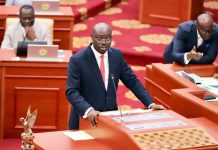As the Ghana Police Service plans to seek interpretation of Article 117 of the 1992 constitution, which deals with the service of criminal process on Members of Parliament, the Speaker of the House, Mr Alban S.K. Bagbin has made it clear that MPs are not above the law.
According to the Speaker, MPs can be investigated and arrested, but constitutional processes for making such arrests must be followed.
“The Rt. Hon. Speaker acknowledges that Members of Parliament are not above the law. The issue is not that a Member of Parliament cannot be investigated or arrested. The issue is the procedure to follow to investigate or arrest a Member of Parliament.
The procedure for causing the arrest of a sitting Member of Parliament or serving a court process must be in accordance with the constitution,” he said, in a statement released yesterday and signed by the Deputy Clerk to Parliament, Mr Eric Owusu Mensah.
The statement was necessitated by an attempted arrest of the MP for Madina, Mr Francis Xavier-Sosu by the police last Sunday.
It would be recalled that the MP led a demonstration on October 25, 2021 over deplorable roads in his constituency.
According to the police, who granted the permission for the demonstration and provided protection on the day, the demonstrators impeded the free flow of traffic, burned tyres and a driver drove recklessly, risking the public’s life.
Based on this, an invitation was extended to the MP to offer some explanation to the behaviour of his constituents, but he snubbed it.
The police officers then reported the conduct of the MP to their superiors and a decision was taken to invite him for interrogation.
But attempts to get him for questioning failed, as the Speaker of Parliament declined their request, citing Article 117 as a basis for the refusal.
The police PRO then went on air to announce that the security agency would go to court to seek an interpretation of Article 117.
Article 117 states that: “Civil or criminal process coming from any court or place out of Parliament shall not be served on, or executed in relation to, the Speaker or a member or the Clerk to Parliament while he is on his way to, attending at or returning from, any proceeding of Parliament.” Order 22 of the Standing Orders of Parliament says the same.
Offering explanation to Article 117, the Speaker indicated that the privileges and immunities of Parliament, the Speaker, Members of Parliament and the Clerk exist to guarantee the independence of the House and ensure that the Legislature is able to undertake its constitutional duties, without unnecessary encumbrances and constraints.
The Speaker explained that the provisions were borne out of the experiences of various democracies in the world over.
These privileges and immunities were first introduced in Ghana under the 1969 Constitution for a good reason.
The 1968 Constitutional Commission Report of Justice Edward Akufo-Addo justified the need for parliamentary immunity from arrest and the service of court processes by maintaining that, such immunity ensured that MPs were not distracted by arrest and detention while attending Parliamentary business, the Speaker said.
Mr Bagbin also noted that since 1993, MPs from both sides of the House have been investigated, arraigned before court and faced trials, and the Office of the Speaker has engaged and facilitated the work of the Police Service in those instances.
He, therefore, urged the police to follow due procedure in exercising their constitutional rights over parliament.
Meanwhile, some MPs who spoke to this reporter regarding this issue urged the police to go to court to seek interpretation since it is their constitutional right.
The Ranking Member of Parliament’s Committee on Constitutional, Legal and Parliamentary Affairs and MP for Akatsi South, Bernard Ahiafor, said “Article 125 of the constitution guarantees citizens the right to seek interpretation. They have every right to go to the Supreme Court to seek for interpretation because the constitution permits it.”
But he indicated that during the 7th parliament, a similar incident happened, but the police and parliament were able to work hand in hand to resolve the issue and, therefore, asked why same cannot be done in the Xavier-Sosu incident.
On his part, Mr Ben Abdallah Banda, former Chairman of the Constitutional, Legal and Parliamentary Affairs indicated that “going to court will bring clarity. It will create a trajectory for others to use as a guide to conduct their affairs. It will enable any other persons who would want to take an action against an MP to know what to do.”
He said he trusts the Supreme Court will interpret and give circumstances or scenarios as to when an MP can or cannot be arrested and hence urged the police to go and seek interpretation.










